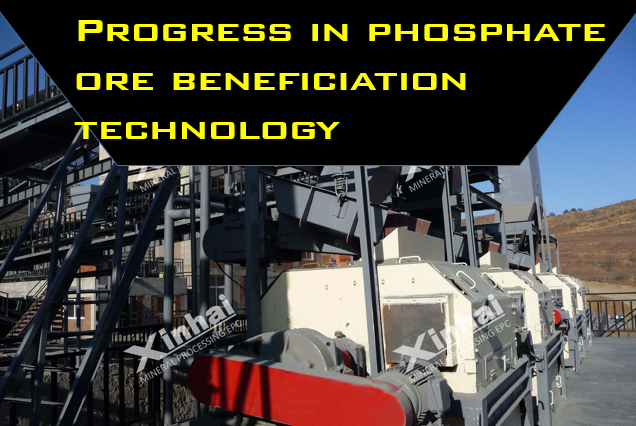Progress in phosphate ore beneficiation technology
2024-11-13 Xinhai (1634)
2024-11-13 Xinhai (1634)
If you have any questions, please contact us through the following ways, we will give you more and better assistance!

Flotation is the most commonly used method in phosphate ore beneficiation. Through the action of reagents, minerals are selectively attached to bubbles to achieve separation. The froth flotation method grinds the mineral into slurry, adds flotation reagents, and introduces air to form bubbles. The hydrophobic mineral particles attach to the bubbles to form a foam product, that is, concentrate, while the hydrophilic mineral particles remain in the slurry and become tailings.
Scrubbing and desludging is a purely physical beneficiation method for phosphate ore, which is suitable for weathered or mud-rich phosphate ore. This method is simple and pollution-free. It removes impurities on the surface of minerals by washing and screening, and selects high-quality phosphate ore. The scrubbing and desludging process in the Dianchi Lake area of Yunnan is relatively mature and is mainly used to sort ores with a high degree of weathering.
Gravity separation, that is, gravity separation, uses the difference in mineral density for mineral separation. When minerals flow in water or air, they are separated due to different movement speeds.
The roasting method decomposes the carbonates in the minerals through high-temperature thermal decomposition to generate carbon dioxide and solid oxides, and then generates solid precipitation through chemical reactions, which adhere to the surface of the ore. Then, the concentrate is separated by scrubbing and desludging to increase the P2O5 content in the ore. Although the roasting method is easy to operate, it is currently less used in the mineral processing industry due to the high temperature requirements, equipment investment and control difficulties.
The electrostatic separation process uses the electrical properties and particle conductivity differences of different minerals to screen ores through high-voltage electric fields and other force fields. Electrostatic separation has the advantages of low power consumption, low cost, good effect, high concentrate grade and high recovery rate, and is gradually gaining attention.

Chemical beneficiation methods change the physical and chemical properties of minerals to selectively dissolve and separate them. The basic process includes roasting, leaching, solid-liquid separation and leachate treatment, and commonly used reagents include dilute sulfuric acid, dilute hydrochloric acid and ammonium chloride.
In summary, there are various beneficiation technologies for phosphate rock, and each method has its own characteristics and applicable scenarios. The rational selection and application of these technologies are of great significance to improving the utilization rate and economic benefits of phosphate rock.